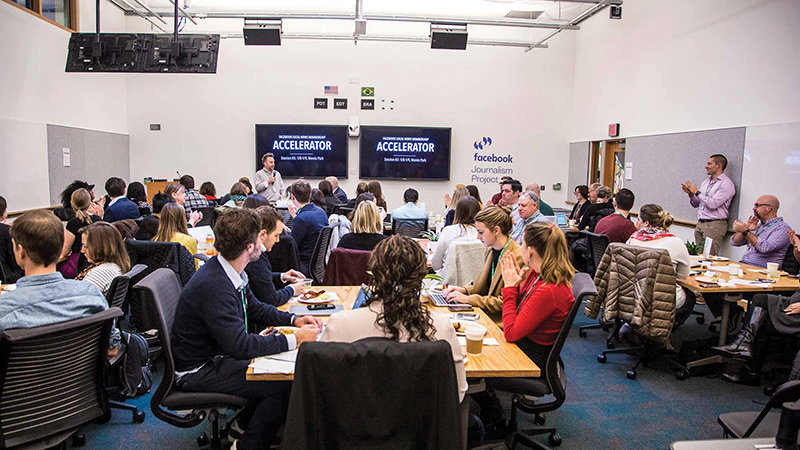 Illustration by Meredith Ewell
Illustration by Meredith Ewell
Facebook.
No word has confounded and frustrated journalists more over the past few years than the name of Mark Zuckerberg’s powerful social media engine, which jumps effortlessly from a platform used to share baby photos to a power tool used to swing elections.
Since its humble beginnings in 2004 as a place for college students, Facebook quickly outpaced its competition (anyone remember Friendster?) and grew into the world’s largest social media platform, with a global audience of 2.32 billion monthly active users. Or to say it another way, roughly one-third of the planet checks their Facebook page at least once a month.
Not surprisingly, the social media giant has disrupted our entire economy, enriching some businesses while bankrupting others, all while taking a lion’s share of all global digital advertising revenue (second only to Google). But few industries have felt the force of Facebook’s impact than journalism.
From the proliferation of fake news to the decline in referral traffic, news publishers have been taking body blows over the years from a company that pitched itself as a friend, only to pull the plug on several short-lived initiatives faster than Lucy yanking the football away from Charlie Brown.
A Troubled Reputation
Where to begin? I guess it all started back in 2006, when Facebook first launched its News Feed to unsuspecting users, who initially reacted negatively when served up a chronological list of content from their friends and acquaintances. A year later, Facebook opened the floodgates when it debuted Pages for brands and companies.
The News Feed has grown into one of the largest drivers of news and information on the planet, where 43 percent of Americans still get a chunk of their news, according to a recent Pew Research Center study. It has also led to a host of problems, including the creation of a cesspool of fake news (which helped further erode confidence in journalism) and the ability for Facebook to randomly throttle referral traffic to publishers.
Then there’s Facebook’s famed push for video. Desperate publishers already hit by declining digital ad rates were convinced that a “pivot to video” would be their saving grace, only to find that Facebook erroneously overstated the average time users spent watching videos. The result? Layoffs across the industry, first of reporters to make room for video producers, then the video producers themselves, when the oasis of video advertising revenue revealed itself to be a mirage.
Brian Manzullo, the social, search and audience editor at the Detroit Free Press, thinks Facebook deserves criticism when it comes to legitimate failures over the years and the harm it has done to journalism. But he also thinks publishers only have themselves to blame for their over reliance on platforms like Facebook.
“I think the biggest issue with many news organizations over the past several years is they’ve placed too many eggs in the basket of Facebook,” Manzullo said. “As long as we understand Facebook is a third party with their own self-interest and business needs, then we can have a healthy relationship with them.”
It’s also worth mentioning Today In, a feature Facebook is currently testing that uses an algorithm to serve local news links to about 400 cities in the United States. While Facebook has touted the feature as a way to help spread meaningful local journalism, an analysis by Nieman Lab found that more than half the links it came across during a week-long study featured “crime, courts, and dead bodies.” (Facebook described Today In as a “work in progress.”)
Facebook’s problems also go far beyond its interaction with the world of journalism. The Cambridge Analytica scandal, which involved a political data firm gaining access to the private information of more than 50 million Facebook users, undermined the platform’s ability to protect user information. There’s also the platform’s susceptibility to widespread misinformation campaigns, most notably Russia’s attempt to manipulate the 2016 presidential elections. Despite the fact the company claims it has made strides in combating the spreading of fake news, many foreign governments—including the United Kingdom and Canada—are seriously considering putting in place strict regulations on Facebook and other social media companies.
“We recognize that self-regulation is not yielding the results that societies are expecting these companies to deliver,” Karina Gould, Canada’s Minister of Democratic Institutions, told BuzzFeed and the Toronto Star.
Australia has already moved against Facebook, passing a strict law where social media executives face possible jail time if their companies don’t remove violent content quickly from their platforms. The law was passed following a deadly massacre in Christchurch, New Zealand, where the shooter live-streamed the deadly rampage on Facebook.
 The Facebook Local News Digital Subscriptions Accelerator meets for their third and final in-person meeting of the program in Menlo Park, Calif. (Photo courtesy of Facebook)
The Facebook Local News Digital Subscriptions Accelerator meets for their third and final in-person meeting of the program in Menlo Park, Calif. (Photo courtesy of Facebook)
Local Journalism
In an attempt to cope with its struggles over the past few years, Facebook has made another pivot, this time an attempt to help foster and grow legitimate local news, which it turns out is an incredibly important part of the platform’s user experience.
“It’s really important for community. And Facebook is all about community,” said Anne Kornblut, the company’s director of news, new initiatives. “We talk a lot about how to build a community through news, and in fact you can’t build a strong community without news.”
 Anne Kornblut
Anne Kornblut
Kornblut, a Pulitzer Prize-winning journalist who has worked for the Washington Post and the New York Times, said Facebook users have made it clear over the years that people want to know what’s going on around them in their own lives, so it’s vital to their business interests to connect individuals with legitimate news and information around their surroundings and interests.
It goes without saying that Facebook’s newfound commitment to local news is more about its own business needs than any altruistic need to help journalism as a whole. But in this case, the Venn diagram between Facebook’s own interests and the needs of local newsroom overlap with these new initiatives. It also doesn’t hurt that Facebook has pledged to spend $300 million over the next three years across all news partnerships, programs and content, though as with anything, the devil will be in the details.
“It’s important for us to not just be helping local news on Facebook, or for us to be sort-of directly supporting local news,” Kornblut said. “We want to make sure we are helping build sustainable business models that can be on Facebook or off Facebook.”
Journalism Tools
Facebook has been attempting to rebuild trust among publishers in earnest since January 2017, when the company first launched its Facebook Journalism Project. Since then, Facebook has rolled out several initiatives and programs that actually have the potential to legitimately benefit newsrooms and help support their business model.
Among the most promising programs Facebook is involved in to support local journalism is their accelerator program to help publishers develop and grow their subscription and membership businesses.
As part of the program, several metro newspapers—including the Boston Globe, the San Francisco Chronicle and the Miami Herald—held meetings where they received coaching from digital subscription experts and received trainings in different ways to market subscriptions. Facebook picked up the entire tab (as well as offered a grant to participants) with the only catch being the publishers had to share their findings with one another.
So far, the program has received rave reviews from its participants, some of whom had been Facebook critics. The Denver Post said following the 12-week program, they saw a 172 percent jump in digital subscriptions, achieved in part by using part of the grant money it received to invest in tools and measurements that provide editors with actionable insights driven by data.
“The program provided the momentum we needed. We went from hoping subscriptions would work to believing they would work,” Dan Petty, the Post’s director of audience development, said in its report on their involvement with Facebook’s accelerator program.
Dorrine Mendoza, a member of Facebook’s news partnerships team, said one of the big takeaways from the accelerator program is that getting journalists from different news organizations in a room together not only helps foster meaningful changes to their subscription business, but it also helps force change in organizations that have been historically resistant to do so.
“A lot of the individuals who participated, let’s just say that maybe they faced a lot of internal challenges they weren’t equipped to navigate,” Mendoza said “Through the accelerator program and talking with others who had similar challenges, they’ve been able to be empowered to present better, get things done and have internal conversations that they needed to have.
Why is this such an innovative and important step for Facebook? Because for the first time, Facebook is working to help newsrooms grow their revenue and business off its own platform. The core of Facebook’s business is to make money off data provided by its users, so the idea that the company would help foster connections off its own platform is a revolutionary step for the company.
Jason Kint, the CEO of Digital Content Next and a frequent critic of Facebook’s business practices, said he thought the initiative was part of the company’s new attempts to play nice with reporters due to the bad publicity the company has received over the past few years. But that doesn’t mean it won’t be beneficial to news organizations.
 Jason Kint
Jason Kint
“They’re doing it for a reason. They’ve got intense public pressure right now…and I think this is kind of a side effort to win over some friends in the news industry,” Kint said. “But to their credit, I’ve heard these events aren’t Facebook focused, that they almost removed themselves from the actual discussion. All positive, I think.”
“Ultimately they need to make the business model work for being a partner with Facebook,” Kint added. “At the end of the day, that means making sure they act as a vehicle for users to have a direct relationship with publishers… and be able to make money off of it, which seems to conflict with (Facebook’s) core business model, which is to make everything free and collect as much data as possible.”
Over the past 18 months, Facebook has offered so many initiatives to help journalists, it feels like a fire hose of options that can quickly get overwhelming, even for someone who covers the company.
The first stop for any journalist should be the website for Facebook’s Journalism Project, which includes a hefty list of all the platform’s local initiatives to date and a link to a certificate course for journalists designed with Poynter Institute. In fact, there are more than 80 online courses available on Facebook Blueprint, covering everything from how to use the platform to generate advertising leads to building brand awareness.
In March, Facebook launched the Facebook Journalism Project Community Network, where the company will open up its sizable checkbook to offer grants to publishers attempting to build community through local news. Facebook will partner with The Lenfest Institute of Journalism, which will review the grants and prioritize projects attempting to strengthen local news coverage.
A favorite tool of mine (which I use often in my day job as a media reporter for the Philadelphia Inquirer) is CrowdTangle, an analytics platform Facebook bought back in 2017 and made free for all users (though sign-up is required).
Basically, CrowdTangle tracks the social media performance of articles being shared in your own market. Many journalists I know use it to see how widely their own stories have been shared, but I’ve always used it to see what articles written by others are performing well in our market. In addition to tracking Facebook, Twitter and Instagram, the platform has the ability to track pages on Reddit and Facebook Groups—both public and private—all through a simple-to-use dashboard.
The Future for Facebook and Local News
Zuckerberg surprised experts in April when he announced that Facebook was developing a new section whose sole purpose would be to curate “trustworthy” news. So far, little is known about this new project, though reports peg its launch sometime by the end of this year.
It remains to be seen how this new feature will work, what level of input publishers will have and what it means for Facebook’s news feed. So far, Zuckerberg is saying all the right things about improving monetization for publishers and fostering a news ecosystem where “new types of journalism can thrive.” He even casually mentioned the possibility of paying publishers a license fee, though at this stage tempered expectations are appropriate.
Zuckerberg’s comments come on the heels of an earlier announcement that Facebook will begin to shift people away from broadcasting their thoughts publicly and into more private conversations with friends and family. Facebook was short on details about this initiative, and it’s unclear what type of disruption it could cause for digital media companies.
One thing seems certain: Zuckerberg expects lawmakers to consider ways of regulating the social media giant, which is why he got out in front of Congress in an op-ed in the Washington Post, where he suggested four areas politicians should focus their bipartisan attention on: harmful content, election integrity, privacy and data portability.
On a most positive note, at the end of March, Facebook quietly made a policy change that exempts qualified news publishers who pay to boost the exposure to news articles on politics from having their content added to the platform’s political ad archive (which created a stigma that news outlets had a political agenda).
While the change itself is a positive step on its own, it also paves the way for a future where legitimate news sources—such as the New York Times—are differentiated from outlets who provide biased or incorrect news reports. It would be dramatic change from how Facebook presents news content today, where everything—regardless of the brand—looks exactly the same.
“If you can be treated differently because you’re a real publisher, then you should be treated differently.” Kint said. “Facebook can use the reputation and the brands of the press to differentiate real news from a lot of garbage.”
Perhaps all the bad publicity Facebook has received over the past few years have forced the company to finally realize what journalists have known for years—Facebook is dependent on their content to keep its users happy. Or perhaps they’re only doling out large chunks of money and resources to make friends in the journalism industry at a time when they need all the support they can get.
Regardless, one thing seems certain—publishers now have their eyes open and are no longer willing to blindly follow Facebook’s changing whims and shifting priorities. Facebook is an important partner and we can help each other, but it is publishers and their credible local journalism that have the leverage.
Comments
No comments on this item Please log in to comment by clicking here